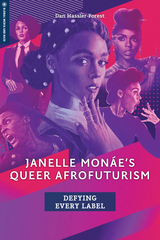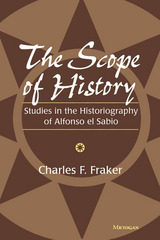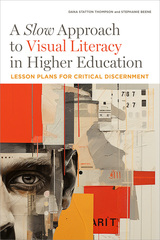4 books about X

Janelle Monáe's Queer Afrofuturism
Defying Every Label
Dan Hassler-Forest
Rutgers University Press, 2022
Singer. Dancer. Movie star. Activist. Queer icon. Afrofuturist. Working class heroine. Time traveler. Prophet. Feminist. Android. Dirty Computer.
Janelle Monáe is all these things and more, making her one of the most fascinating artists to emerge in the twenty-first century. This provocative new study explores how Monáe’s work has connected different media platforms to strengthen and enhance new movements in art, theory, and politics. It considers not only Monáe’s groundbreaking albums The ArchAndroid, The Electric Lady, and Dirty Computer, but also Monáe’s work as an actress in such films as Hidden Figures and Antebellum, as well as her soundtrack appearances in socially-engaged projects ranging from I May Destroy You to Us. Examining Monáe as a cultural icon whose work is profoundly intersectional, this book maps how she is actively reshaping discourses around race, gender, sexuality, and capitalism. Tracing Monáe’s performances of joy, desire, pain, and hope across a wide range of media forms, it shows how she imagines Afrofuturist, posthumanist, and postcapitalist utopias, while remaining grounded in the realities of being a Black woman in a white-dominated industry. This is an exciting introduction to an audacious innovator whose work offers us fresh ways to talk about identity, desire, and power.
Janelle Monáe is all these things and more, making her one of the most fascinating artists to emerge in the twenty-first century. This provocative new study explores how Monáe’s work has connected different media platforms to strengthen and enhance new movements in art, theory, and politics. It considers not only Monáe’s groundbreaking albums The ArchAndroid, The Electric Lady, and Dirty Computer, but also Monáe’s work as an actress in such films as Hidden Figures and Antebellum, as well as her soundtrack appearances in socially-engaged projects ranging from I May Destroy You to Us. Examining Monáe as a cultural icon whose work is profoundly intersectional, this book maps how she is actively reshaping discourses around race, gender, sexuality, and capitalism. Tracing Monáe’s performances of joy, desire, pain, and hope across a wide range of media forms, it shows how she imagines Afrofuturist, posthumanist, and postcapitalist utopias, while remaining grounded in the realities of being a Black woman in a white-dominated industry. This is an exciting introduction to an audacious innovator whose work offers us fresh ways to talk about identity, desire, and power.
[more]

The Scope of History
Studies in the Historiography of Alfonso el Sabio
Charles F. Fraker
University of Michigan Press, 1996
The Scope of History brings together a selection of classic and new articles in the field of Spanish and specifically Castilian history, focusing on the historiography of Alfonso X, King of Castile. The volume shows how the Alfonsine histories became well-fashioned and independent works of literature, having begun as simple compilations of preexisting texts. The author seeks to point out that the editors of the Alfonsine histories amplify and alter their sources, rejoin them with artistic skill, and generally arrange the elements into an ordered system. In so doing, Fraker explains, the final text speaks uniquely, giving voice to themes alien to the original texts. Fraker also aims to illustrate the scope of the editorial labor which set Alfonso's General Estoria and his Estoria de España apart from their contemporary histories.
In his introduction the author addresses the place of Alfonso's work in its own time, giving the reader a notion of what other works in the genre were like and how they differ. The connecting thread running through these chapters is a continuing focus on the art of the compiler. Medieval historical compilations are by definition scissors-and-paste jobs, stringing older texts together to tell new, different stories. But the Alfonsine editors bend the rules: in the short run they make their work yield the themes they think important, and in the long run they build a literary monument of impressive architecture.
Charles F. Fraker is Professor Emeritus in Romance Languages, University of Michigan.
In his introduction the author addresses the place of Alfonso's work in its own time, giving the reader a notion of what other works in the genre were like and how they differ. The connecting thread running through these chapters is a continuing focus on the art of the compiler. Medieval historical compilations are by definition scissors-and-paste jobs, stringing older texts together to tell new, different stories. But the Alfonsine editors bend the rules: in the short run they make their work yield the themes they think important, and in the long run they build a literary monument of impressive architecture.
Charles F. Fraker is Professor Emeritus in Romance Languages, University of Michigan.
[more]

The X in Sex
How the X Chromosome Controls Our Lives
David Bainbridge
Harvard University Press, 2004
A tiny scrap of genetic information determines our sex; it also consigns many of us to a life of disease, directs or disrupts the everyday working of our bodies, and forces women to live as genetic chimeras. The culprit--so necessary and yet the source of such upheaval--is the X chromosome, and this is its story. An enlightening and entertaining tour of the cultural and natural history of this intriguing member of the genome, The X in Sex traces the journey toward our current understanding of the nature of X. From its chance discovery in the nineteenth century to the promise and implications of ongoing research, David Bainbridge shows how the X evolved and where it and its counterpart Y are going, how it helps assign developing human babies their sex--and maybe even their sexuality--and how it affects our lives in infinitely complex and subtle ways. X offers cures for disease, challenges our cultural, ethical, and scientific assumptions about maleness and femaleness, and has even reshaped our views of human evolution and human nature.
[more]

The X of Psychology
An Essay on the Problem of the Science of Mind
Phillips Mason
Harvard University Press
READERS
Browse our collection.
PUBLISHERS
See BiblioVault's publisher services.
STUDENT SERVICES
Files for college accessibility offices.
UChicago Accessibility Resources
home | accessibility | search | about | contact us
BiblioVault ® 2001 - 2025
The University of Chicago Press









